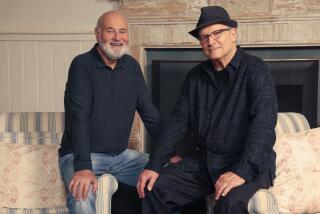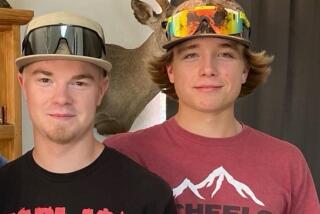Hospital Mixup Makes Civic Leader a ‘John Doe’
Joseph T. Brooks was a well-known community leader in Long Beach. He was president of the city’s transit board and a member of the Public Corporation for the Arts. He was involved in numerous local groups, including the YMCA and the American Cancer Society.
But in death, he became a “John Doe” whom authorities forgot about.
Brooks’ body was unclaimed for 18 hours at a hospital on Los Angeles’ Eastside after he died of an apparent heart attack Saturday afternoon.
Despite that the fact that he had been identified less than an hour after he died and his wallet given to hospital workers, White Memorial Medical Center in Boyle Heights did not call his family.
It was early Monday morning--more than 40 hours after his death--before his wife and family friends learned that Brooks, 64, was dead and his body was at the coroner’s office.
The delay should not have happened, hospital officials admit. But that is of little comfort to Brooks’ grieving friends.
“It’s not as if he had an unlisted number or was an indigent,” said family friend Bill Kennedy. “What blows my mind that is no one bothered to call and he died alone.”
He recently was named vice president of the American Public Transit Assn., an industry group for mass transit agencies.
He was also a member of the Long Beach Centennial Celebration Committee, a past vice chairman of the city Planning Commission and president of the local chapter of the National Assn. for the Advancement of Colored People.
Brooks and his wife, an elementary school principal, were to host a community gathering at their home Saturday in the Bixby Knolls section of Long Beach.
‘Run an Errand’
“Preparations were going nicely at 2:30 p.m. when he said he had to run an errand,” his wife said in a brief telephone interview. “That was the last time I saw him.”
She began worrying when Brooks did not return to greet party guests.
“I was concerned at 3 o’clock; I was concerned at 4 o’clock,” she said. “I was concerned when the party ended at 6. My husband always called if he was going to be late.”
Highway Patrol spokesman Mike Maas said Brooks was southbound on the Golden State Freeway near the Whittier Boulevard over-crossing at about 4:20 p.m. when he slumped over the steering wheel. His car swerved, brushing another auto, and came to a stop. Brooks was rushed to White Memorial where he died at 5:41 p.m., officials said.
Although he came to the hospital without any identification, the Highway Patrol officer at the accident scene told hospital officials of Brooks’ identity less than an hour after he died.
Still, Brooks’ body remained at the hospital for 18 hours before the coroner’s office claimed it.
Late Sunday night, however, the coroner’s office called the Long Beach Police Department to try to notify the family. A patrol car was sent to the Brooks’ home but no one was there, a department spokesman said. No subsequent attempt was made.
White Memorial’s executive director of nursing, Tammy McMann, said emergency-room personnel were busy with an extremely heavy load of 29 other cases when Brooks was brought in.
Usually, White Memorial’s emergency room may handle 70 to 80 cases a week, officials said.
McMann said the physician on duty in the emergency room, Dr. Said Mostafi, and the nurse in charge, whom she did not identify, failed to notify Brooks’ widow after he died. They also failed to notify other emergency room personnel when the shift changed at 7 p.m.
Although the hospital was busy, McMann said, there was no excuse for the failure to notify Brooks’ family.
“The physician notifies next of kin, and nursing personnel support that activity under normal circumstances,” McMann said. “In this particular situation, we failed to do that. I’m sorry about that, and we’re taking steps to see that that doesn’t happen again.”
McMann declined to say if any disciplinary action would be taken against Mostafi or the nurse. Efforts to reach them late Wednesday were not successful.
More to Read
Sign up for Essential California
The most important California stories and recommendations in your inbox every morning.
You may occasionally receive promotional content from the Los Angeles Times.










